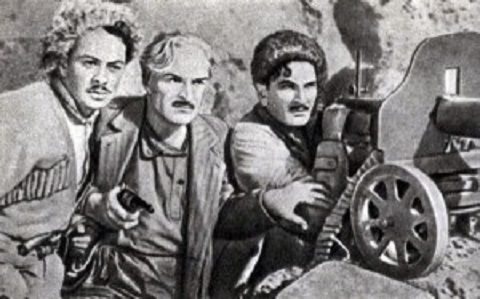The Armenian Weekly. Let’s discuss propaganda this week through two examples. One is modern, somewhat subtle, but practiced by a known lackey. The other is a rehash, much cruder in its form, and brought to us from a surprising source.
Brenda Shaffer (along with Svante E. Cornell, perhaps included to lend more legitimacy to the piece, you’ll see why as you read on) wrote “The United States Needs to Declare War on Proxies” in “Foreign Policy” last week. If her name rings a bell, it’s because she’s one of Baku’s hacks, made to look respectable under cover of a PhD and because “she specializes on energy in international relations and energy policy in the Caspian region and has written or edited several books of these topics” according to her Wikipedia entry. She was called out by the NY Times when she wrote an op-ed piece about Artsakh for that publication and did not reveal her connection to Azeri government figures. It was so egregious that even Radio Free Europe/Radio Liberty reported on the incident.
This time, the article in question begins innocuously enough (from an Armenian/Artsakh perspective). She starts out discussing the assassination of Iranian general Soleimani and how it was a good thing because it sent a message from the US to Iran that killings of Americans through proxy forces would no longer be tolerated. But from this, she quickly jumps to the establishment of “proxy regimes” by Russia “most prominently” somehow disregarding the fact that Solemani was operating in Iraq and Syria, extensively against ISIS/Daesh. How that’s a “proxy” is one mystery. The bigger mystery remains her leap from that, to the establishment of what, to paraphrase Shaffer, are proxy/puppet states set up so that the puppet-master can avoid the international stigma and repercussions of invading and occupying another country’s territory.
It gets even better as we read on. Somehow, the “most prominent” user of the technique she describes gets less attention than the Republic of Armenia whose relationship with the Republic of Artsakh is presented as the same as the ones Russia has with the small states it recognizes in Georgia and Ukraine. Let’s not omit the fact that Shaffer cites no other examples of this “proxy” arrangement despite referring to it as an increasingly common practice. It’s obvious this is yet another hit piece targeting Artsakh, the RoA and our Diaspora by an operative of the Aliyev regime.
Read also
Please read the article yourself if you’re unconvinced. Either way, write the editors of “Foreign Policy” and urge them not to lend credibility to people who are clearly functioning as proxies for governments, especially ones with as horrible a track record of persecution and human rights abuses as that of Azerbaijan.
The second example is, in some ways, even worse than Shaffer in that it is internal, a self-inflicted propaganda wound. On March 1st, the Smithsonian Institution screened an old, 1938 vintage, Soviet propaganda film, Zangezur, claiming it “chronicles Armenia’s civil war in the 1920s, depicting the Bolsheviks’ efforts in the mountainous Zangezur region to defeat the Dashnaks, the counterrevolutionary rulers of the area.” It depicts Karekin Nzhdeh as a sniveling coward. This is the same Nzhdeh, known for his bravery, who was instrumental in retaining Zankezoor as part of (ultimately) Soviet Armenia! And who organized the Armenian Youth Federation. And who was treacherously captured by the Soviets and died in one of their prisons.
I suppose this would have been OK if the film was shown in the context of Soviet propaganda. It is not. Instead we are told “Zangezur was a trendsetter for Armenian revolutionary drama, and the soundtrack by Aram Khachaturian features folkloric songs, a march, and two beautifully lyrical interludes.” We are also told, “Known as the father of Armenian cinema, Hamo Bek-Nazaryan (1892–1965) stands with Eisenstein, Pudovkin, and Dovzhenko in the history of cinema. A popular actor in pre-Revolutionary Russian film, he was also a founder of the Hayfilm (Armenfilm) studio in Yerevan.” No mention whatsoever of the film’s original intent is made.
And here’s the kicker – it was tagged as being supported by the embassy of the RoA! Have these people no sense of public relations? Why would they endorse something that undercuts a key figure in the very existence of the state they represent? The state that regained its independence from the very authorities that made the propaganda film… Plus, given recent efforts to demonize Nzhdeh by Azerbaijan, something like this plays right into Baku’s hands.
I realize Yerevan is in no position to fund public relations activities in the same lavish manner as Azerbaijan and Turkey do. But the ANCA in Washington is a good source of advice on this front. The embassy should use it and other similar resources to avoid gaffes such as supporting the screening of this film.
Please, contact the embassy and express your dismay and displeasure about this episode and request they be more astute in the future.
Generally, be on the alert for propaganda attacks against us and inform our advocacy organizations and media if you do discover any. That’s how the most successful groups in the US keep their concerns and issues at the forefront of the country’s agenda.


























































